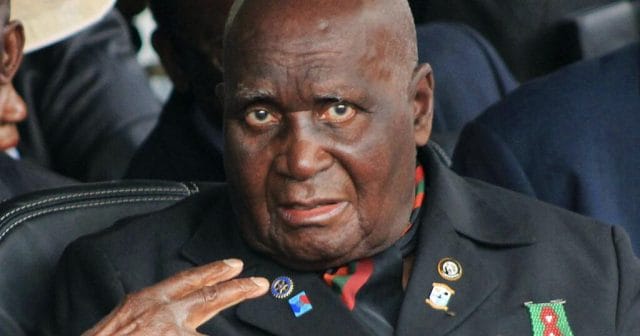
Former president of Zambia Kenneth Kaunda died peacefully at 2:30 pm (1230 GMT) on Thursday of pneumonia at a military hospital where the 97-year-old had been receiving treatment since Monday.
The news comes by way of — as announced by the government which declared 21 days of national mourning as televised announced by Cabinet secretary Simon Miti.
He expressed President Edgar Lungu’s deep regret and sorrow at the passing of the nation’s beloved founding father, icon and global statesman.
“You have gone at a time we least expected,” Lungu said on Facebook, describing him as a “true African icon.”
The government declared 21 days of national mourning with flags flying at half-mast and all forms of entertainment suspended — in honour of the now-deceased leader who was popularly and affectionately known as “KK” by his people.
Lusaka resident, Lucksone Musendo, remembers the African leader with pride.
“KK (Kenneth Kaunda, ed.) was a good hero. He fought for mother Zambia for us to attain independence and I feel like I will forever remember and cherish what he did for us Zambians.”
Another resident, Helen Tembo, is feeling the loss of the African treasure.
“I feel bad. At first, I didn’t believe that he was gone until I went on social media I’ve seen posters and I was like okay. That’s very sad for us.”
– ‘Africa’s Gandhi’ –
Kenneth Kuanda was the head of the main nationalist party i.e. the left-of-centre United National Independence Party (UNIP) that led the country after the colonial era.
While in power for 27 years after Zambia’s independence from Britain on October 28, 1964, KK became known as “Africa’s Gandhi” due to his fight as an activist for independent movement, racial justice and equality for black people in other countries in the region.
Kuanda even cooperated with South Africa’s African National Congress (ANC) political party.
The nickname came from his non-violent, independence-related approach in the 1960s.
He eventually ceded power in the first multi-party elections in 1991 — losing to trade unionist Fredrick Chiluba.
Despite the change over of power between different political parties since Kaunda left office, the landlocked southern African country has enjoyed relative stability.
In later life, Kaunda regained stature as an African statesman, helping to mediate crises in Zimbabwe and Kenya.
News of his death started filtering through social media and by the time government officially announced it, sombre Zambians had been anxiously glued to television screens in public places.
– ‘Charismatic, selfless’ –
In a show of respect, the largest opposition party, the United Party for National Development (UPND), temporarily halted all election campaigning ahead of the August 12 vote.
“We urge all to remain peaceful and united as we continue to reflect on the life of… Kaunda, the immense sense of duty, service and sacrifice with which he led and served our country,” the UPND said in a statement.
One of Kaunda’s last major international public appearances was in December 2013 during Nelson Mandela‘s funeral. At the age of 89 even then, he jogged up to the podium to pay tribute.
“This is really a dark day for Zambia,” a 50-year-old Lusaka resident Herbert Simbeye, who attended the same church as Kaunda, told AFP.
“At his 90th birthday, my son was one of the people who gave KK flowers at church”.
“We will not forget Kaunda’s contributions to the struggles against colonialism and apartheid,” the Nelson Mandela Foundation said in a statement.
In neighbouring Botswana, President Mokgweetsi Masisi has declared seven days of mourning in honour of the “charismatic” and “selfless” Kaunda, whom he described as an “iconic statesman of the highest credentials.”

